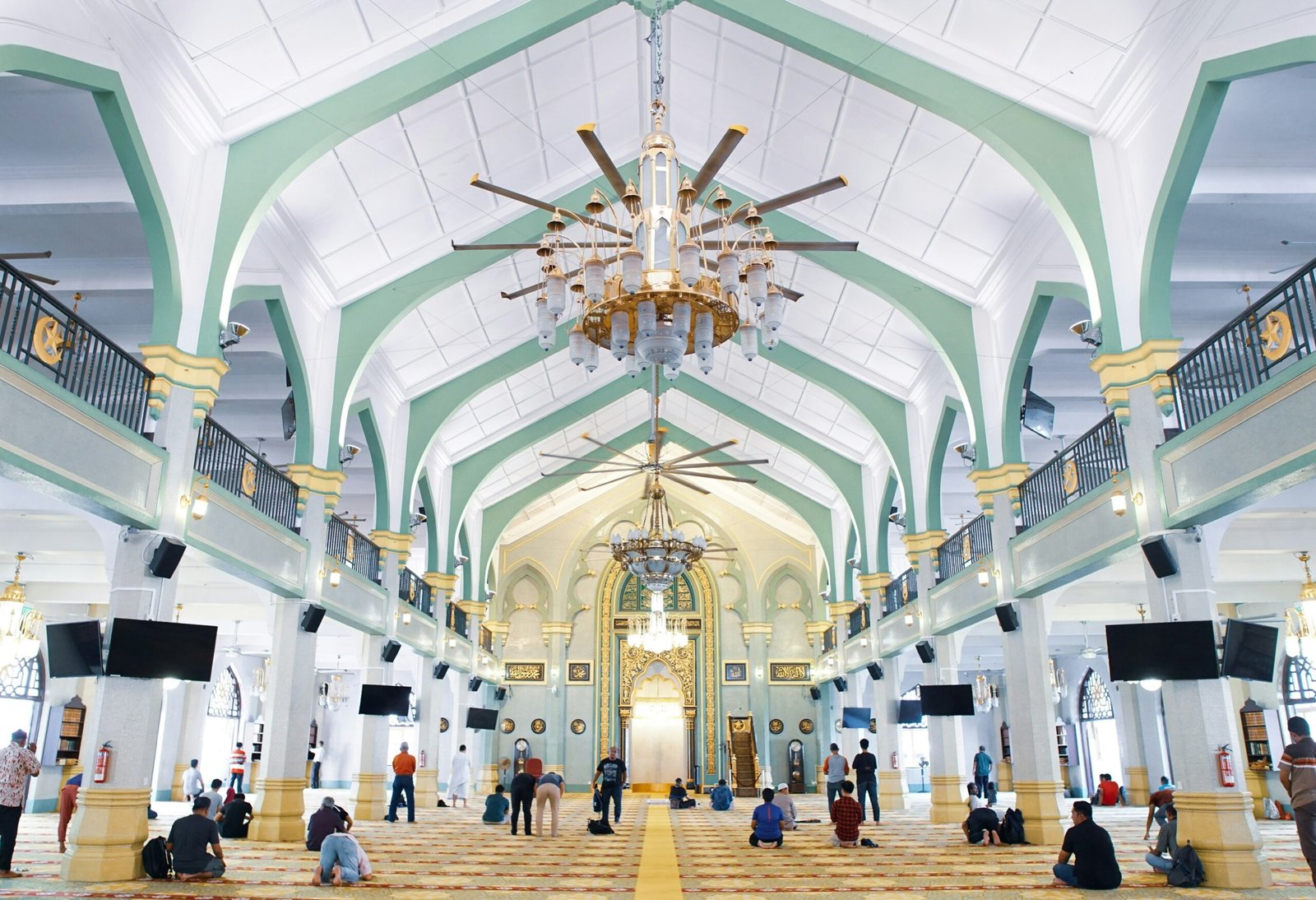Introduction to the Importance of Friday in Islam
The day of Friday, known as “Jumma” in Islam, holds a place of immense significance within the Muslim community. Unlike other days of the week, Friday is imbued with both spiritual and social dimensions that elevate its status among believers. It is considered not just a day of congregation, but also a day of heightened piety and reflection.
Religiously, Friday is distinguished by the Jumma prayer, a special congregational prayer that is obligatory for Muslim men and highly recommended for women. This prayer replaces the regular Zuhr (midday) prayer and is marked by a sermon, known as the Khutbah, which serves to enlighten and guide the community on various aspects of faith and daily life. The spiritual significance of Friday is further emphasized in the Quran, where it is referred to as a day of assembly and remembrance of Allah.
On a social level, Friday acts as a unifying force within the Muslim community. It is a day when people gather at mosques, not just for prayer, but also to engage in communal activities and discussions. This congregation fosters a sense of unity and brotherhood, reinforcing the social fabric of the community. The act of coming together for Jumma prayer serves as a powerful reminder of the collective identity and mutual responsibilities that Muslims share.
Moreover, the cultural significance of Friday extends beyond the mosque. It is a day often associated with family gatherings, communal meals, and acts of charity. Many Muslims take this opportunity to visit friends and relatives, thereby strengthening familial and social bonds. In various Muslim-majority countries, Friday is often observed as a weekly holiday, allowing for a break from the routine of daily work and providing an opportunity for rest and rejuvenation.
Thus, the importance of Friday in Islam is multifaceted, encompassing religious obligations, social cohesion, and cultural practices. It is a day that encapsulates the essence of Islamic teachings and traditions, making it a cornerstone of Muslim life around the world.
Historical Context and Origins of Jumma
The concept of Jumma, or Friday, as a significant day of worship and community gathering in Islam, finds its roots in the era of the Prophet Muhammad (PBUH). Historically, Friday was chosen as a day of communal prayer and reflection for Muslims, marking a shift from the previous practices observed by other Abrahamic faiths. This designation was not arbitrary; it was divinely ordained and has been preserved in Islamic tradition ever since.
During the early days of Islam, the Prophet Muhammad (PBUH) emphasized the importance of Friday by instituting the congregational prayer known as Salat al-Jumu’ah. The Prophet (PBUH) often delivered sermons, or Khutbahs, on this day, addressing the spiritual, social, and moral dimensions of the Muslim community. These sermons were pivotal in uniting the early Muslim Ummah, fostering a sense of solidarity and shared purpose among the believers.
According to various Hadiths, the Prophet Muhammad (PBUH) highlighted the virtues of Friday by stating that it holds a special place in the eyes of Allah. In one Hadith, he mentioned, “The best day on which the sun has risen is Friday; on it Adam was created, on it he was made to enter Paradise, and on it he was expelled therefrom” (Sahih Muslim). This underscores the profound spiritual significance attributed to Friday in Islamic tradition.
Moreover, the Quran itself references the importance of Jumma in Surah Al-Jumu’ah (62:9-10), where believers are instructed to hasten towards the remembrance of Allah when the call to prayer is made and put aside their worldly affairs temporarily. This Quranic injunction further solidified the status of Friday as a day dedicated to worship, reflection, and community engagement.
In summary, the historical context and origins of Jumma are deeply embedded in the early Islamic tradition. From the time of the Prophet Muhammad (PBUH), Friday has been a day of immense spiritual significance, characterized by communal prayers, sermons, and a collective pause from daily routines to focus on faith and unity.
Religious Duties and Practices on Jumma
Friday, known as Jumma in Islam, holds a special place in the hearts of Muslims around the globe. It is not merely a day of the week but a spiritual occasion imbued with a variety of religious duties and practices that underscore its significance. One of the central religious obligations on this day is attending the Friday prayer, or Salat al-Jumma. This congregational prayer is highly emphasized in Islamic teachings and is considered a communal obligation for Muslim men. It offers an opportunity for the community to come together, fostering a sense of unity and fraternity among believers.
In addition to Salat al-Jumma, reciting Surah Al-Kahf on Friday is another esteemed practice. Many Muslims make it a point to read or listen to this specific chapter from the Quran as it is believed to offer spiritual protection and enlightenment. The recitation of Surah Al-Kahf on Jumma serves as a reminder of the values and lessons contained within its verses, encouraging reflection and contemplation.
Moreover, Jumma is a day that encourages Muslims to engage in further acts of worship and charity. Performing additional prayers, known as Nawafil, is recommended to attain spiritual closeness to Allah. Supplications and seeking forgiveness are also integral practices on this day. Acts of charity, or Sadaqah, are particularly emphasized, reflecting the spirit of generosity and compassion that Islam promotes. Whether it is giving to those in need or simply being kind to others, these acts are seen as a means to purify one’s soul and earn divine rewards.
Overall, the religious duties and practices associated with Jumma serve to deepen a Muslim’s faith and commitment to their religious principles. Through communal prayers, Quranic recitation, and acts of kindness, Friday becomes a day of spiritual rejuvenation and communal harmony.
The Friday Khutbah: Sermon and Its Significance
The Friday Khutbah, a central element of the Jumma (Friday) prayers, holds significant importance in the Islamic tradition. Delivered before the communal Friday prayer, the Khutbah serves multiple purposes, including spiritual education, moral upliftment, and community cohesion. This sermon provides a unique opportunity for the Imam or religious leader to address the congregation on various topics, ranging from theological discussions and ethical guidance to contemporary issues facing the Muslim community.
The structure of the Friday Khutbah is traditionally divided into two parts. The first part usually begins with the praise of Allah and prayers for the Prophet Muhammad (peace be upon him). This segment often includes recitations from the Quran and Hadith, followed by an exposition of their meanings and implications for daily life. The second part is generally more pragmatic, focusing on specific concerns that may be affecting the community, such as social justice, family responsibilities, or the importance of maintaining unity among Muslims.
The role of the Khutbah extends beyond mere religious instruction. It acts as a medium for spiritual rejuvenation, offering congregants a moment of reflection and introspection. The sermon encourages Muslims to align their lives with Islamic principles and provides actionable advice for personal and communal improvement. This weekly gathering thus helps in fostering a sense of belonging and shared purpose among the attendees.
Moreover, the Khutbah is an essential tool for disseminating knowledge and raising awareness about pressing issues. In times of crisis or societal change, the Friday sermon can offer guidance and reassurance, helping the community navigate through challenges with resilience and faith. By addressing relevant topics in a timely manner, the Khutbah ensures that the teachings of Islam remain applicable and responsive to the needs of the Muslim community.
Spiritual Benefits of Observing Jumma
Jumma, or Friday, holds a place of paramount importance in Islam, and observing this day comes with a plethora of spiritual benefits for Muslims. One of the most significant aspects is the purification of sins. It is believed that attending the Friday prayer, known as Salat al-Jumu’ah, and engaging in its associated rituals can lead to the forgiveness of minor sins committed in the past week. This purification process serves as a spiritual cleansing, allowing believers to start anew with a clean slate, thus enhancing their spiritual well-being.
Furthermore, Jumma serves as a cornerstone for the strengthening of faith. The Friday sermon, or Khutbah, is an integral part of the Jumma prayer. Delivered by the Imam, the Khutbah provides valuable religious teachings, reflections on moral conduct, and guidance on various aspects of life. This weekly dose of spiritual nourishment helps Muslims to fortify their faith, gain a deeper understanding of their religion, and stay connected with their spiritual goals. The collective act of gathering for prayer encourages individuals to remain steadfast in their beliefs and practices.
Another notable benefit of observing Jumma is the sense of communal unity and brotherhood it fosters. The Jumma prayer is a congregational one, bringing together Muslims from different walks of life to pray side by side. This gathering serves as a powerful reminder of the unity and equality that Islam promotes. It strengthens communal bonds, as individuals come together to support and uplift one another. The sense of belonging and solidarity experienced during Jumma prayers reinforces the collective identity of the Muslim community, fostering a spirit of brotherhood and mutual respect.
In essence, the observance of Jumma is more than just a ritualistic practice; it is a multifaceted spiritual experience that purifies sins, strengthens faith, and fosters a sense of unity and brotherhood among Muslims. Through these spiritual benefits, Jumma serves as a weekly touchstone for personal and communal growth in the Islamic faith.
Social and Community Aspects of Jumma
Jumma, or Friday, holds a special place in the Islamic tradition, not only for its religious significance but also for its role in fostering social cohesion and community spirit. The communal prayer, known as Salat al-Jumu’ah, serves as a weekly gathering that transcends individual worship, emphasizing collective responsibility and mutual support among Muslims. This communal aspect is pivotal in creating an environment where social bonds are strengthened, and community welfare is prioritized.
One of the key features of Jumma is the Khutbah, a sermon delivered by the Imam before the congregational prayer. The Khutbah serves as a platform for disseminating important community news, sharing educational insights, and addressing social issues. It is a vital medium through which the community stays informed about both religious and worldly matters, ensuring a well-rounded and cohesive understanding of current events and ethical considerations.
Beyond the formalities of prayer and sermon, Jumma provides an invaluable opportunity for Muslims to interact on a personal level. The day often sees an increase in social activities, such as communal meals, charitable initiatives, and informal gatherings. These interactions play a crucial role in building a supportive network where individuals can share their joys and challenges, offer and receive advice, and bolster each other’s faith and resilience.
Jumma also serves as a catalyst for charitable actions within the community. The spirit of giving is particularly emphasized on this day, with many Muslims choosing to engage in acts of charity, whether through monetary donations, volunteering, or simply offering a helping hand to those in need. This collective effort not only addresses immediate needs but also fosters a culture of empathy and social responsibility.
In essence, the social and community dimensions of Jumma are integral to its observance. The day acts as a weekly reminder of the interconnectedness of the Muslim Ummah, reinforcing the values of unity, compassion, and collective well-being. Through communal prayers, shared information, and social interactions, Jumma continues to be a cornerstone of Islamic community life, nurturing both spiritual and social harmony.
Friday holds a distinctive place in various religious traditions, albeit with varying degrees of significance. In Christianity, for instance, Friday is often associated with Good Friday, a pivotal day commemorating the crucifixion of Jesus Christ. Good Friday is observed with a sense of solemnity and reflection, marking the culmination of the Lenten season and the beginning of the Easter weekend. This day is characterized by a variety of religious observances, including fasting, prayer, and special church services, emphasizing the themes of sacrifice and redemption.
In Judaism, Friday is intrinsically connected to the Sabbath, or Shabbat, which begins at sunset on Friday and lasts until nightfall on Saturday. The preparation for Shabbat starts on Friday, often referred to as Erev Shabbat, where families engage in activities to ready themselves for the day of rest. This involves cooking special meals, completing household chores, and participating in a Friday night dinner that includes traditional prayers and rituals. The emphasis is on rest and spiritual rejuvenation, providing a stark contrast to the typical workweek.
While both Christianity and Judaism acknowledge Friday in their religious practices, the day does not hold the same weekly centrality as it does in Islam. In Islam, Friday, or Jumma, is considered the most important day of the week, often referred to as the ‘weekly Eid.’ It is a day of communal prayers, spiritual reflection, and sermons that bring the community together. The Friday prayer, known as Salat al-Jumu’ah, is a significant congregational prayer that replaces the regular midday prayer, underscoring the day’s importance. This weekly congregation serves as a reminder of the social and spiritual unity among Muslims.
Understanding the comparative significance of Friday across these religions highlights the unique position it holds in Islam. While Christianity and Judaism observe Friday through specific rituals and significant events, Islam elevates this day to a weekly focal point of communal worship and spiritual engagement, distinguishing it from other religious traditions.
Conclusion: The Enduring Importance of Jumma
Throughout the various sections of this blog post, we have delved into the multifaceted significance of Friday, or Jumma, in Islam. From its historical roots to its profound spiritual and communal aspects, Jumma emerges not merely as a weekly observance but as an integral part of Muslim identity and practice. The sanctity of this day is underscored by its mention in the Quran and numerous Hadiths, emphasizing its importance in the weekly rhythm of Muslim life.
Jumma serves as a weekly congregation that fosters unity and solidarity among Muslims. The Friday prayer, or Salat al-Jumma, is a pivotal moment of communal worship, bringing together individuals from various walks of life in shared devotion. This collective experience not only reinforces spiritual bonds but also acts as a reminder of the broader Muslim ummah, highlighting the interconnectedness of all believers.
Moreover, the day of Jumma is imbued with opportunities for spiritual rejuvenation. The special prayers, recitation of Surah Al-Kahf, and increased acts of charity are all practices that enrich one’s spiritual journey. These acts serve to cleanse the soul, elevate one’s consciousness, and strengthen the connection with the Divine.
In addition to its spiritual dimensions, Jumma possesses significant social and cultural implications. It is a day of reflection, learning, and community engagement. The khutbah, or sermon, delivered during the Friday prayer, addresses contemporary issues and provides guidance, making it a source of continuous education and moral upliftment for the community.
In light of these multifaceted aspects, it becomes evident that the importance of Jumma extends beyond mere ritualistic observance. It is a day that encapsulates the essence of Islamic teachings, fostering a sense of community, spiritual growth, and social responsibility. Therefore, understanding and observing Jumma with greater devotion and consciousness can lead to a more enriched and fulfilling religious experience.




